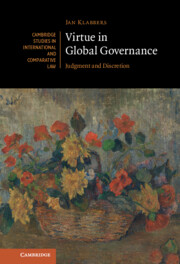Book contents
- Virtue in Global Governance
- Cambridge Studies in International and Comparative Law: 170
- Virtue in Global Governance
- Copyright page
- Dedication
- Contents
- Preface
- 1 Introduction
- 2 Ethical Challenges
- 3 The Individual in Global Governance
- 4 Virtue Ethics and Global Governance
- 5 On Virtue and Law
- 6 Operationalizing Virtue
- 7 Understanding Governance
- 8 Defining Governance
- 9 Evaluating Governance
- 10 Epilogue
- Bibliography
- Index
- Cambridge Studies in International and Comparative Law
10 - Epilogue
Published online by Cambridge University Press: 28 July 2022
- Virtue in Global Governance
- Cambridge Studies in International and Comparative Law: 170
- Virtue in Global Governance
- Copyright page
- Dedication
- Contents
- Preface
- 1 Introduction
- 2 Ethical Challenges
- 3 The Individual in Global Governance
- 4 Virtue Ethics and Global Governance
- 5 On Virtue and Law
- 6 Operationalizing Virtue
- 7 Understanding Governance
- 8 Defining Governance
- 9 Evaluating Governance
- 10 Epilogue
- Bibliography
- Index
- Cambridge Studies in International and Comparative Law
Summary
As the preceding chapters have suggested, there might be merit in paying some attention to the virtues when discussing global governance, both in the abstract and in highly concrete manifestations. Those merits can come in various forms and guises, and can probably be grouped neatly together under three headings. First, the virtues can have some explanatory force: they can help us to understand things we would otherwise be unable to grasp. They can help us understand why Finland’s wartime president Risto Ryti made his “personal” deal with Nazi Germany, or why Sergio Vieira de Mello decided to persuade Cambodian refugees to return to their country of origin.
- Type
- Chapter
- Information
- Virtue in Global GovernanceJudgment and Discretion, pp. 255 - 266Publisher: Cambridge University PressPrint publication year: 2022

